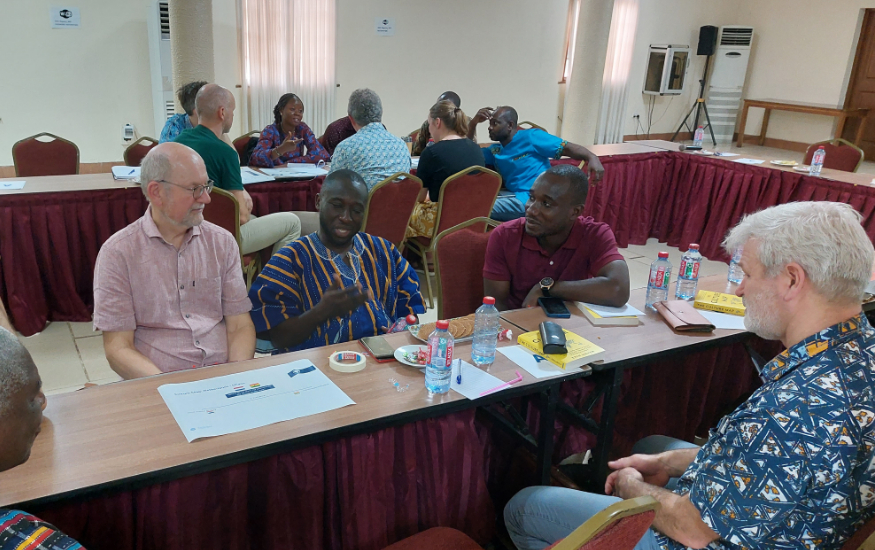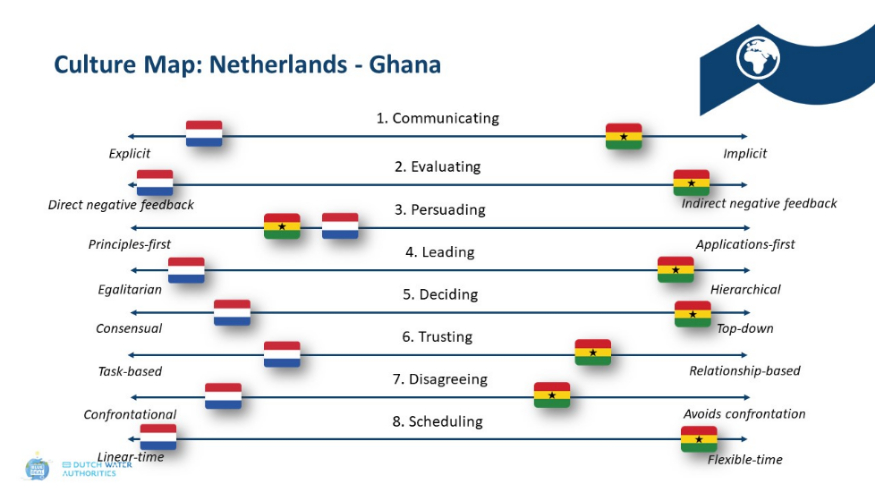In February, the Dutch Blue Deal team organised a Culture Day together with their Ghanaian Blue Deal colleagues. The main goal was to understand each other’s work cultures better. This ultimately helps in a more effective cross-cultural collaboration.

Since 2019, the Dutch Blue Deal team has worked together with several colleagues from the Ghanaian Water Resources Commission. During that time they got to know each other well. In the workplace, but also personally, outside of office hours. This has already created interesting situations and challenges in their cross-cultural communication. This could have something to do with cultural differences.
How well do we really know each other’s cultures?
So the Dutch and Ghanaian colleagues took the time to ask themselves the questions: how well do we really know each other’s cultures? Do we know the mutual differences and similarities and how can we use them as advantages in our collaboration? During the recent working visit in February, all Blue Deal members travelled to Accra to create a Culture Map during a special Culture Day. We focused on having more in-depth conversations about each other’s cultures by discussing perceptions, cultural differences, and expectations, to improve certain work situations. Because your culture affects you as a person, but also how you act in the workplace and how you work together.
Culture Map
The common thread of this day was the Culture Map. This is a method by Erin Meyer that provides more insight into a work culture by evaluating a work culture on 8 scales. Consider, for example, the way of communicating: is it very direct and clear in your culture or indirect and do you have to read between the lines in a conversation? Or what about the power distance: is there always a strict hierarchy in the workplace or can you approach the boss directly? These are all questions that started the conversations. Based on concrete examples from the collaboration, they learned more about each other’s doings and actions. The result was a Culture Map of the Netherlands and Ghana in which differences and similarities are clearly mapped out on the scales.

Insight and understanding
The Culture Day has given the team more insight and understanding of each other’s culture, but it has certainly strengthened their bond. They now know better where someone else is coming from and also understand their own actions and frustrations better from time to time. This ultimately helps in a more effective collaboration. Some examples of the conclusions of the Culture Day:
- In terms of communication style the 2 cultures stand quite far apart from each other on the scale. In the Netherlands, people are very direct, whereas Ghana has a more implicit style of communication. Working in such a cross-cultural team, it would be useful to make more explicit recaps and summaries of meetings to catch any misunderstandings or confusions.
- When it comes to making progress in the Blue Deal programme, the scale of ‘Deciding’ in the Culture Map is also an interesting one to highlight. The 2 cultures also stand quite far apart from each other on this scale, but there are some easy tips to make the cross-cultural collaboration more effective. For example, it starts with awareness about the differences and together they could try to discuss and decide upon a decision-making method and work that out explicitly. Later, when big decisions must be made, they can revisit the decision-making process to make sure it is generally understood and accepted.
- In the Netherlands we are keen on being tightly organised and would very much like to create a detailed programme for a work visit, full of appointments. But in the Ghanaian work culture it is very normal to draw up an outline for a programme with main goals and also leave sufficient room for strengthening the personal relationship. The latter definitely has its advantages. This gave the team the insight that they will now try to make the programme of the next work visit somewhat based on Dutch work culture, but mainly on the basis of Ghanaian work culture.
Recommendation for other Blue Deal teams
It is valuable to take a moment to look at your own culture and others. Because you normally see the world from our own cultural perspective. Therefore, it is difficult to imagine that another culture might do things differently. But when you start to identify what is typical in your own culture, but different in others, then you can begin to open a dialogue of sharing, learning, and, ultimately, understanding. So take time to talk about each other’s work cultures and create your own Culture Map.
The Blue Deal also provides a mandatory training ‘Working with Other Cultures’ for Dutch experts who travel abroad for the Blue Deal. Read a report on one of these trainings.
